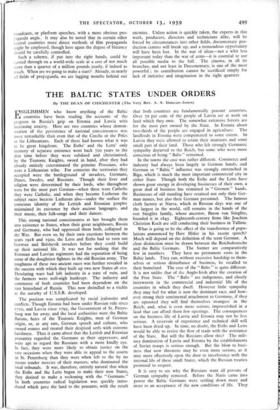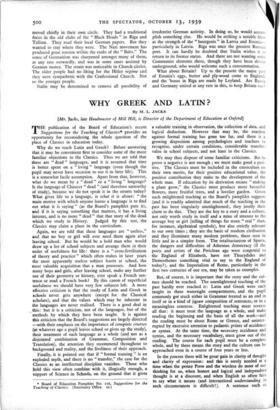THE BALTIC STATES UNDER ORDERS
By THE DEAN OF CHICHESTER (The Very Rev. A. S. Duncan-Jones)
ENGLISHMEN who know anything of the Baltic countries have been reading the accounts of the progress in Russia's grip on Estonia and Latvia with increasing anxiety. Here are two countries whose demon- stration of the persistence of national consciousness was more remarkable than even that of the Czechs or the Poles or the Lithuanians. Each of these had known what it was to be great kingdoms. The Esths' and the Letts' only memory of separate existence went back 70o years to the dim time before they were subdued and christianised, by the Teutonic Knights, sword in hand, after they had already entirely exterminated the genuine Prussians, who were a Lithuanian tribe. For centuries the territories they occupied were the battleground of invaders, Germans, Danes, Swedes, and Russians. Though their lives and religion were determined by their lords, who throughout were for the most part German—when these were Catholic they were Catholic, and when they became Lutheran the subject races became Lutheran also—under the surface the conscious identity of the Lettish and Estonian peoples maintained its existence by their ancient languages, and their music, their folk-songs and their dances.
This strong national consciousness at last brought them into existence as States, when their great neighbours, Russia and Germany, who had oppressed them both, collapsed in the War. But even so, by their own exertions between the years 1918 and 192o, the Letts and Esths had to turn out German and Bolshevik invaders before they could build up their national life. It was not for nothing that the Estonian and Latvian regiments had the reputation of being some of the doughtiest fighters in the old Russian army. The toughness of these two ancient races was further revealed in the success with which they built up two new States ab ovo. Desolating wars had left industry in a state of ruin, and the farmers were well-nigh bankrupt. The industry and commerce of both countries had been dependent on the vast hinterland of Russia. This now dwindled to a trickle as the autarky of U.S.S.R. developed.
The position was complicated by racial jealousies and conflicts. Though Estonia had been under Russian rule since 1710, and Latvia since 1795, the Government of St. Peters- burg was far away, and the local authorities were the Baltic Barons, heirs of the Teutonic Knights, men of German origin, or, at any rate, German speech and culture, who owned estates and treated their despised serfs with extreme harshness. Thus it came about that the Lettish and Estonian peasantry regarded the Germans as their oppressors, and were apt to regard the Russians with a more kindly eye. In fact, they were more likely to obtain justice on the rare occasions when they were able to appeal to the courts in St. Petersburg than they were when left to the by no means tender mercies of their masters, who dominated the local tribunals. It was, therefore, entirely natural that when the Esths and the Lens began to make their new States, they desired to make a reckoning with the " Germans." In both countries radical legislation was quickly intro- duced which gave the land to the peasants, with the result that both countries are fundamentally peasant countries. Over 7o per cent. of the people of Latvia are at work on land which they own. The somewhat extensive forests are for the most part owned by the State. In Estonia about two-thirds of the people are engaged in agriculture. The landlords in Estonia were compensated to some extent. In Latvia they were allowed to retain their mansions and some small part of their land. Those who felt strongly Germanic sympathy departed to the Reich, but some who were more conscious of being " Baits " remained.
In the towns the case was rather different. Commerce and industry had always been largely in German hands, and German or " Baltic " influence was strongly entrenched in Riga, which is much the most important commercial city in either State. Though both the Esths and the Letts have shown great energy in developing businesses of their own, a great deal of business has remained in " German " hands. Businesses of old standing have retained not only their Ger- man names, but also their German personnel. The famous cloth factory at Narva, which in Russian days was one of the largest in the world, still remains in the hands of the von Stieglitz family, whose ancestor, Baron von Stieglitz, founded it in 1845. Eighteenth-century firms like Joachim Christian Koch are still conducting their business in Tallinn.
What is going to be the effect of the transference of popu- lations announced by Herr Hitler in his recent speech? Much will depend on the definition of the term German. A clear distinction must be drawn between the Reichsdeutsche and the Baltic Germans. The former are comparatively few in numbers. They have no permanent roots in the Baltic lands. They can, without excessive hardship to them- selves or serious disturbance of business, be recalled to their homeland. The case of the " Batts " is quite different. It is not unlike that of the Anglo-Irish after the creation of the Free State. The " Baits " are indigenous, and closely interwoven in the commercial and industrial life of the countries in which they dwell. However little sympathy they may feel for what is now the dominant race, and how- ever strong their sentimental attachment to Germany, if they are uprooted they will find themselves strangers in the Reich, and, what is even more serious, impoverished in a land that can afford them few openings. The consequences on the business life of Latvia and Estonia may not be less serious. A reservoir of experience and technical skill will have been dried up. In time, no doubt, the Esths and Lens would be able to revive the flow of trade with the assistance of the State. But will the Russians allow this? The mili- tary domination of Latvia and Estonia by the establishments of Soviet troops is serious enough. But the blow to busi- ness that now threatens may be even more serious, as it may more effectively open the door to interference with the internal life of these small States, which the Russian treaties promised to respect.
It is easy to see why the Russians want all persons of German sympathy removed. Before the Nazis came into power the Baltic Germans were settling down more and more to an acceptance of the new conditions of life. They moved chiefly in their own circle. They had a traditional locus in the old clubs of the " Black Heads " in Riga and Tallinn. They read their local German papers. But they wanted to stay where they were. The Nazi movement has produced great tension within the ranks of the " Baits." The sense of Germanism was sharpened amongst many of them, at any rate outwardly, and was in some cases assisted by German money. The strain was noticeable in Church circles. The older people had no liking for the Hitler regime and they were sympathetic with the Confessional Church. Not so the younger people.
Stalin may be determined to remove all possibility of irredentist German activity. In doing so, he would accom- plish something else. He would be striking a notable blo•a at the strength of the " bourgeois " in Latvia and Estonia— particularly in Latvia. Riga was once the greatest Russian port. It can hardly be doubted that Stalin wishes it :u return to its former status. And there are not wanting some Communist elements there, though they have been driven underground, who would welcome such a consummation.
What about Britain? Up to the present the major pan of Estonia's eggs, butter and ply-wood come to England. and the 'buses in Riga are made by Leyland. Are Russia and Germany united at any rate in this, to keep Britain out











































 Previous page
Previous page